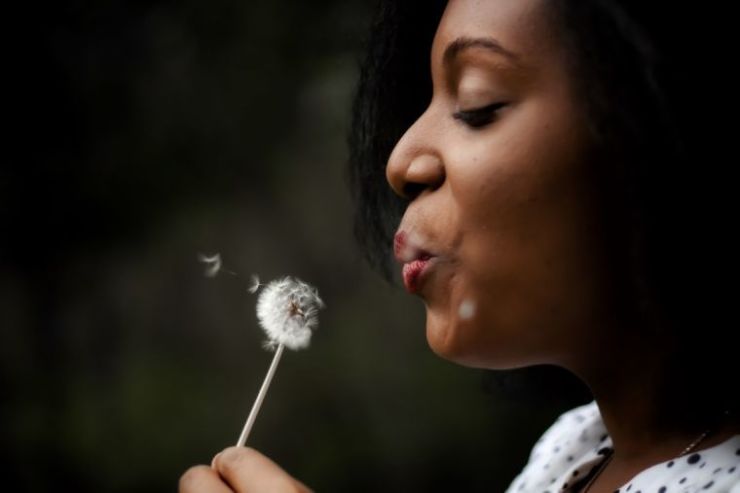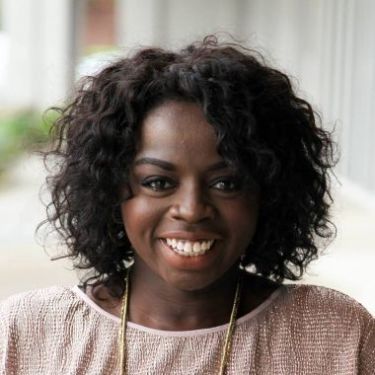
What do you do if you are a woman with a dream and a hope for your life but nagging doubts and insecurities threaten to de-rail you? You rise up in spite of these, says Jo Saxton, a popular speaker and the author of 'Ready to Rise: Own Your Voice, Gather Your Community, Step Into Your Influence'.
Jo speaks to Christian Today about her journey to owning her voice, and what that looks like for a black woman both in the Church and the wider culture.
CT: Was owning your own voice something that came naturally to you or did you have to work at it?
Jo: I wish it had come easily but it was something I definitely had to work at and, in many ways, had to fight for and that's probably for a number of reasons. I was a child of the Eighties and am Nigerian by heritage so I think that being a minority played into whether I thought my voice was heard.
Then, as I grew into church spaces, these were predominantly in white majority contexts and although there was never a place where I wasn't welcome, the question was always there: to what degree am I welcome? Because everyone is welcome but the real question is: can you lead? Can you contribute? Because if you can do those things then you really are welcome in the true sense of the word.
So it was a journey for me, working out what it meant to be called to lead and to know that there was nothing wrong with me!
CT: Do you feel there are still limits on women in the Church?
Jo: It's got better but there's a massively long way to go. It's wonderful to see women ordained but my question - and this is for the Church in the UK and in the States - is still this: are we designing training pipelines which are accessible for women and for the lives they actually lead? Is our leadership development accessible to women? Are there mentoring opportunities for women?
We don't like to say it but so much depends on who you know, but we should be celebrating women's gifts and hearing their unique voice for who they are. And if we believe this is important, then it's not just the figurehead who is important. It is, of course, hugely important to have visible role models but the pathways to leadership have to be developed so that it's natural and accessible for women to journey on them.
So there are a lot of questions that I am still asking. Like, are women able to contribute or are they having to fit into moulds? Even in the training processes, are we recognising the different spaces of a woman's life? What does it look like for a woman with young children to train and to have a call on her life? Because there are often assumptions about a man with young children, that someone else is making adjustments so that these things are possible for him.
The thing is that out there in the world, women are already leading. Women are running companies, they are accountants, doctors, teachers, raising young children, volunteering in church; they are doing so many things. But is the Church investing in them so that they can make maximum kingdom impact with their time and energy? Because they are worth far more than their offering, but sometimes the Church doesn't act like it!

CT: What role do you think Christian women have in opening up these opportunities in the Church?
Jo: I think sometimes we can be almost waiting to be 'discovered', as if we're a contestant on American Idol or The Voice! But people are not mind readers so we do have to say something if we feel called and we do have agency here. We can use our voices and it should be a natural part of our lives.
I'm reminded of Sunday nights when I was growing up. All the women in my family would come over to my house for hair braiding. Sunday was hair braiding night! But it was also the time when all of these conversations about work and life would take place. It was like a brain trust where the women in the family would come together to work through all of the issues they were experiencing in life.
They had lived in England for 20 years by this time, but they were still navigating racism on top of all the other things like work and how to raise their kids to the best of their ability and so on.
I think there is space in the Church where women can do that too, but I don't know if we fully utilize the power of peer mentoring. I call it 'the village' - the village of people who can raise you as a leader.
CT: Racism has become a big talking point in society and in the Church since the death of George Floyd. What's been your experience of racism in the Church?
Jo: We don't have enough time for the amount of things I could tell you, from my experience in both the Church in the UK and in the US!
CT: Did you feel like that was an extra hurdle for you to get over, being both a woman and being black?
Jo: It was, because racism is evil but it is also abusive, corrosive and damaging. As Christians we believe that humanity is made in the image of God but when someone is racist, they are actively resisting that and dehumanising you.
And racism takes many forms. It can be people being rude to you or not giving you opportunities because they don't think you deserve to be there. Or it can be people touching your body or your hair without your permission. But whichever form it takes, if you are being consistently dehumanised for the colour of your skin, then all of those things take their toll on you and have a corrosive impact.
Certainly for me as a black Christian woman, it felt like an additional hurdle because it was almost like there was a conversion to Christ and then a conversion to the culture. If I assimilated, I could go further. But the reality is that I am black and it's very evident from the moment you meet me!
CT: Would you say the culture of the Church in the West is still very white majority?
Jo: It is, because diversity and inclusion are different things. People can be in the room but who is setting the tone and how many voices do you invite to create a culture? When I was growing up, there were people who talked about being 'colour blind' when it came to race. But is it really the case that God doesn't see colour? Did God design us in that way? Why lie about this and pretend that something isn't there when it is, because we should be able to celebrate the uniqueness of someone who is made in the image of God in a way that's different from us. It's damaging to pretend otherwise.
So we have to ask ourselves where we are in our journey as communities, not just in terms of welcome but in terms of inclusion at every level. How are we responding to the needs of our community and what does it mean in our leadership structures? Hopefully people are asking themselves these questions - and won't run out of energy in asking these questions!
CT: What would you say to a young black woman today who is doubting whether she can be the woman you describe in your book - a woman who is ready to rise, to own her own voice and community, and spread her influence?
Jo: I would say that God delighted to make her the way He made her, that she is fearfully and wonderfully made, that she has gifts and abilities and purpose, and a contribution to make to the Kingdom of God in the renewal of all things. She is valuable and her voice is important in whatever area she is called, whether that's race or something else.
And I would say: it's hard. We've all had experiences where the opposite has been declared to us. But we need to build around us the kind of people who see us, know us and celebrate us. And it's important that we don't get used. I am not the diversity quota, I am the child of God.
CT: When it comes to owning our destiny, do you think this is an issue that is harder for women than men? Or do you think the challenges are just different?
Jo: I do think it is harder for women because of the gravitational pull of culture. I wouldn't be so presumptuous as to speak for what all guys feel, and there are of course challenges and nuances for them too, but I don't think they're equally weighted. I remember what it meant for us as women to see the first women ordained in the Church of England back in the Nineties, but it's still the case that I have been to multiple churches where I have been the first woman speaker - and the first black person in the pulpit.
I'm not saying that male leaders don't have challenges but I think it is harder for women because this is all still quite new and when you are breaking through barriers, the glass falls somewhere. We talk about shattering glass ceilings and there being new opportunities, all of which is true. But where does the glass go? It tends to go on the women blazing the trail.
And it's important to note that not all of this started with the Church either. It's just the world we are in. And I think the UK is actually further ahead than the US when it comes to this, for example in areas like maternity leave - maternity leave is such a game changer.
But I don't want to make it sound like there hasn't been any progress either. There are certain things that make a massive difference and I don't think the Church utilizes these as much as they could do, and there's clearly work to be done. There are wonderful things that have been done but we want to get to the point where women aren't exceptions but rather there is just a consistent pipeline that women are coming through.
CT: A popular mantra in the Instagram era is "you've got this'' but if we're honest, we probably don't always feel like we've "got this". Is it important to own our weaknesses too?
Jo: Oh yes, and if we want to lead then we are going to have to own them! Because I don't think we always have "got this". But at the same time, it's about agency - there are things we have responsibility for. We have to engage with the broken pieces of our story and reckon with who we are when no one else is watching. We have to admit when we're not confident, and embrace God's perfect power in our weakness. And it's important to identify the weaknesses that would seek to devour the very things we're called to. It's not only about doors being opened, but we've got to figure out how we walk through those doors, too.
CT: We've all got our comfort zones, those places where we feel 'safe'. What would you say to someone who's struggling to take that first step to get beyond what feels comfortable?
Jo: I remember hearing one pastor say: 'Your calling is calling.' And I'm reminded that Jesus said if anyone would come after me, they would pick up their cross, deny themselves daily and follow me. That is the cross. It's vulnerable, it's death to self, and it's not comfortable.
And I would hate people to have the wrong idea that we just snap our fingers and we've done it. Because anyone who is responding to their calling is paying a price. Let's not pretend that people aren't paying a price to step faithfully into what they're doing, and that it's not confusing or conflicting sometimes. It's not a platitude when I say Jesus is our best example in telling us to pick up our cross and deny ourselves and follow him.
So we need to be asking ourselves: what does it look like to pick up our cross as that woman struggling to get out of her comfort zone? Maybe it's to deny our self-doubt, to deny that temptation to self-sabotage or self-flagellate - and to do that daily.
There have been moments where I have just had to show up - and show up daily. I might be hating it in the moment but I'm called to do it, and my calling is not based on my feelings and it's never been determined by how confident or brave or courageous I have felt. Otherwise I never would have done it!
With my first public speaking engagement, I physically shook and for a while, I was physically sick each time. I had to reckon with these thoughts of: who does she think she is, this black immigrant Nigerian outsider from the inner city? Who is she to be telling us what God is saying?! I had to reckon with those thoughts for years.
CT: The inner voice seems to be our biggest enemy sometimes!
Jo: Yes, and it's reinforced by the culture around us. You open magazines and you rarely see yourself in them. You turn on the TV or look to the people in positions of influence and none of them look like you.
When we look at the world around us, there may be lots of advertising targeting women but more often than not, it's telling us how thin we need to be, how cute we need to be, how young we need to be, how sexually desirable we need to be.
It's not telling us how powerful God has made us because of his presence in our lives. It's not telling us how much potential we have in being part of the renewal of all things.
And to be honest we're not always hearing those things from the pulpit either. We're not hearing that we are change agents in society and that we can do something. The sermons might give us a bit of information on behaviour modification but they're not fundamentally affirming all that we could be or achieve when we step out into God's calling on our life. And that's what we need to be hearing.



